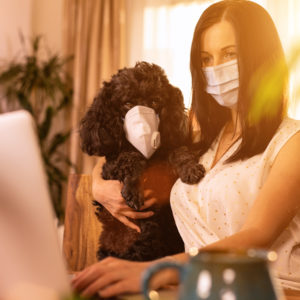Does your cat have a Zoom account?
Before the COVID-19 pandemic, veterinary facilities offering the option of having a pet diagnosed via cell phone or tablet were few and far between. But veterinarian telehealth has surged dramatically nationwide since the coronavirus lockdown — a trend that’s likely to continue on news of two cats and a dog being struck with COVID-19.
On March 24, the U.S. Food and Drug Administration (FDA) announced it would temporarily suspend a requirement for veterinarians to examine animals in person to “limit human-to-human interaction and potential spread of COVID-19.”
“During this time, we need to provide veterinarians with the latitude to expand the use of telemedicine in the care of animals, not only pets but also the animals that produce our food,” FDA Commissioner Stephen Hahn said.
The greatest risk of COVID-19 exposure to veterinarians, their teams and the public comes from person-to-person contact — thus the increase in telehealth sessions.
Kate Harrish, president of the Pennsylvania Veterinary Medical Association, said the use of telehealth has picked up significantly in the state during the pandemic, in part thanks to a change in regulations.
“In Pennsylvania, in order to prescribe medications or diagnose, you’d have to have seen the pet in person until now,” Harrish told InsideSources. “But because some of those restrictions have been lifted… there a lot of veterinarians turning to telehealth — and it’s on the upswing.”
Should animals be tested for coronavirus?
Harrish said currently she doesn’t think so, despite at least two confirmed cases of house cats contracting the virus in New York last week, and a dog belonging to an infected family in North Carolina testing positive on Monday. Five tigers and three lions have also tested positive in NYC’s Bronx Zoo.
Officials believe the exotic animals were infected by a zookeeper who had the virus.
The COVID-19 pandemic is one the toughest challenges New York’s veterinarians have seen, said Tim Atkinson, executive director of the New York State Veterinary Medical Society.
“But, as good medical people, they’re still prioritizing the safety of the pets and people,” Atkinson added.
Still, the Centers for Disease Control and Prevention (CDC) reports animals do not “play a significant role in spreading the virus that causes COVID-19,” and routine testing of household pets is not recommended.
“Based on the limited information available to date, the risk of animals spreading COVID-19 to people is considered to be low,” the CDC says on its website. “We are still learning about this virus, but it appears that it can spread from people to animals in some situations.”
Meanwhile, CNBC reports that pet telehealth consultations for various conditions have increased 170 percent nationwide month-over-month.
VCA Animal Hospitals — one of the nation’s largest operator of veterinary hospitals — has launched video consultations at most of its facilities across the country. VCA operates more than 1,000 hospitals nationwide.
“Technology has made great advances recently that make telehealth in veterinary medicine possible,” said VCA Group Vice President Dr. Mike Barnett.
“This capability is still rudimentary for most veterinarians, but VCA has made a concerted effort to develop a strong infrastructure to make telehealth a viable alternative for some cases,” Barnett told InsideSources. “And the timing could not be better!
“During this time of social distancing, we now have the ability to support patient health in specific presentations with the pet and the owner never leaving their home.”
Mobile telehealth apps serve as a platform for vets to diagnose a pet and determine whether in-person treatment is required. Veterinarians can conduct video calls, examine photos and videos uploaded by pet owners and even provide electronic prescriptions.
If a provider determines that a pet requires emergency medical services, the owner can bring it to an animal-care facility — many of which are implementing new social distancing efforts.
Patients are handed off to hospital staff from the parking lot, or at the front door, and once the diagnoses or treatment is done the pet is returned to the owner in the parking lot.
VCA had foreseen that veterinarians and clients would take to telehealth.
The American Veterinary Medical Association (AVMA) recommends people sick with the virus limit contact with pets and other animals. However, the group says there is “no reason at this time” to believe pets could be a source of infection.
“Until more is known about this virus, if you are ill with COVID-19 you should restrict contact with pets and other animals, just as you would restrict your contact with other people,” the AVMA says on its website.
“When possible, have another member of your household or business care for any animals, including pets while you are sick.”

